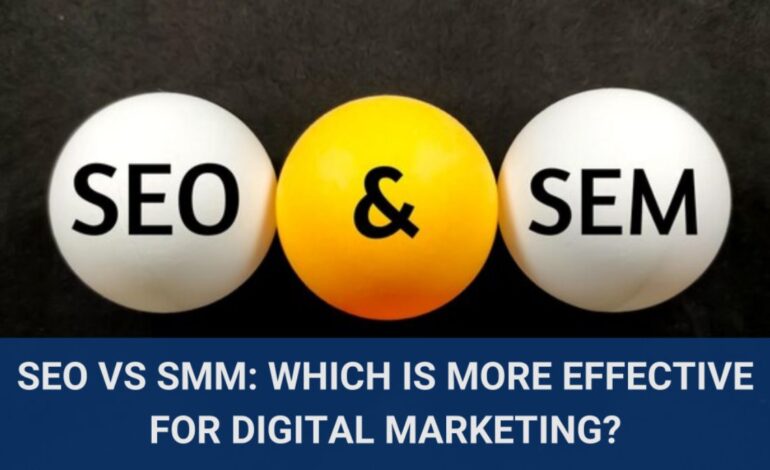In today’s digital world, having a strong online presence is essential for success. But with so many strategies available, how do you decide where to invest your time and budget? Two of the most popular digital marketing strategies are SEO (Search Engine Optimization) and SMM (Social Media Marketing).
Each offers unique benefits, but which one is the best fit for you? Let’s dive into the basics, advantages, and differences between SEO and SMM, so you can make an informed choice for your business.
What is SEO?
SEO (Search Engine Optimization) is the practice of optimizing your website and its content to rank higher on search engines like Google. By following SEO best practices, your website can appear on the first page of search results for keywords relevant to your business, leading to organic traffic (free clicks) from potential customers.
Key Elements of SEO
- Keyword Research: Identifying keywords people search for in your niche.
- On-Page SEO: Optimizing website elements like title tags, meta descriptions, and images.
- Technical SEO: Ensuring a well-structured website, fast load times, and mobile-friendly design.
- Content Creation: Producing valuable, keyword-rich content that solves user needs.
- Backlink Building: Earning links from credible websites to improve domain authority.
What is SMM?
SMM (Social Media Marketing) is the practice of using social media platforms to promote your products or services, increase brand awareness, and engage with your audience. SMM focuses on platforms like Facebook, Instagram, Twitter, LinkedIn, and TikTok, allowing businesses to directly connect with their target audience through posts, stories, reels, and ads.
Key Elements of SMM
- Audience Targeting: Using demographics, interests, and behavior data to reach specific groups.
- Content Creation: Creating engaging visuals, videos, and posts that resonate with your audience.
- Engagement: Building relationships through comments, messages, and user-generated content.
- Social Advertising: Running paid ads to increase reach and conversions.
- Analytics: Measuring engagement, reach, and conversions to optimize future campaigns.
SEO V/S SMM – The Key Differences
While both strategies aim to increase brand visibility and drive traffic, they do so in different ways. Let’s look at some key differences:
| Factor | SEO | SMM |
|---|---|---|
| Objective | Improve organic search rankings | Build brand presence on social media |
| Traffic Source | Organic search engine traffic | Social media platforms |
| Time to See Results | Slow (3-6 months or longer) | Fast (immediate for ads) |
| Audience Reach | Users actively searching for services | Users scrolling social feeds |
| Cost | Low ongoing costs, but requires effort | Higher cost due to paid ads |
| Longevity | Long-term results | Short-term engagement |
| Content Type | Informative articles, blog posts, etc. | Engaging images, videos, reels |
Advantages Of SEO
- Long-Term Benefits: SEO is a long game. Once you’re ranked on search engines, you can maintain your position with regular updates and occasional adjustments.
- Higher ROI: SEO tends to bring in organic traffic, which means you’re not paying for each click or view.
- Authority Building: High-ranking websites are perceived as more credible, helping to build trust with visitors.
- Focused Targeting: SEO targets users already interested in your content, making them more likely to convert.
Advantages Of SMM
- Immediate Reach: Social media can generate immediate traffic and engagement, especially if you run ads.
- Enhanced Brand Personality: SMM allows you to express your brand voice, values, and personality directly to your audience.
- Two-Way Communication: Social platforms facilitate engagement and conversation, allowing for direct interaction with customers.
- Viral Potential: Social posts, especially videos, have a high chance of going viral, boosting brand visibility quickly.
Which Is Better for Your Business?
The decision between SEO and SMM depends on your business goals, resources, and timeline. Here’s a quick guide to help you decide:
1. Consider Your Timeline
- SEO: If you’re looking for long-term growth and are willing to wait several months to see substantial results, SEO is the way to go.
- SMM: If you need immediate visibility or a quick boost in traffic, SMM offers faster results, especially with paid ads.
2. Evaluate Your Budget
- SEO: Requires time and resources but is relatively affordable in the long run.
- SMM: Can become costly, especially with ongoing ad spend, but can also yield faster results.
3. Think About Audience Behavior
- SEO: Best for businesses that rely on people searching for products or services. If your target audience is actively searching for what you offer, SEO will bring them to you.
- SMM: Ideal for brands targeting younger audiences, who spend significant time on social media, or for businesses that benefit from visual appeal, such as fashion, food, or lifestyle brands.
4. Match Your Content Type
- SEO: Works best if your brand relies on in-depth information, such as blogs, guides, and resources.
- SMM: Perfect for visual and interactive content like videos, images, and stories that capture attention quickly.
How to Maximize Results Using SEO and SMM Together
For many businesses, the best approach isn’t choosing SEO or SMM but rather finding a way to use both strategies effectively. Here’s how to maximize results:
Use SMM to Support SEO: Share blog posts, guides, and other SEO content on social media to drive traffic back to your site and boost search engine rankings.
Run SMM Campaigns Around SEO Content: Promote specific blog posts or pages through social media ads to increase visibility and engagement.
Monitor Analytics: Both SEO and SMM platforms provide analytics. Use this data to see which strategy drives more traffic, engagement, and conversions and to optimize your campaigns.
Repurpose Content: Turn a popular blog post into an infographic or video for social media, or share snippets of SEO content as posts to keep social audiences engaged.
Common Challenges and Solutions in SEO and SMM
- SEO Challenge: Achieving High Rankings
- Solution: Consistently update your website, focus on high-quality content, and earn backlinks.
- SMM Challenge: Staying Relevant on Social Media
- Solution: Engage regularly with followers, stay updated on social media trends, and experiment with new formats like stories and live videos.
- SEO Challenge: Keeping Up with Algorithm Changes
- Solution: Follow SEO updates, optimize based on best practices, and diversify your traffic sources to avoid over-reliance on Google alone.
- SMM Challenge: Gaining Organic Reach without Ads
- Solution: Build a community, post consistently, and encourage user-generated content to engage followers without solely relying on paid ads.
Conclusion
Choosing between SEO and SMM ultimately depends on your business needs, resources, and audience behavior. If you want sustained, long-term growth and are willing to put in the time, SEO can be a great investment. On the other hand, if you’re looking for immediate engagement and have the budget for ads, SMM can quickly put your brand in front of potential customers.
For the best results, consider combining both strategies. A well-rounded digital marketing approach, using SEO to improve visibility and SMM to engage with your audience, ensures that you’re covering all your bases in today’s competitive online world. In the end, a blend of SEO and SMM can help you reach new customers, build credibility, and grow your business efficiently.









